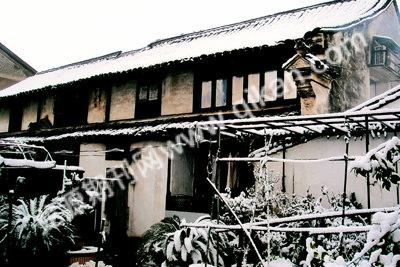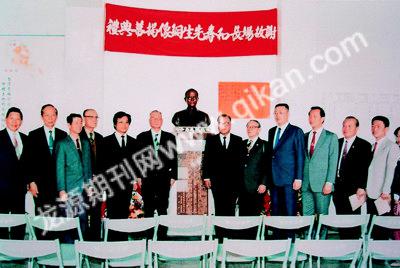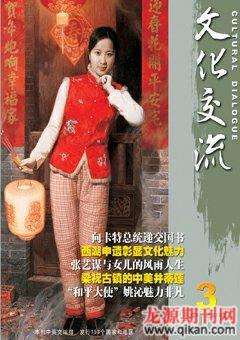A?。校椋铮睿澹澹颉。铮妗。茫瑁椋睿澹螅濉。裕澹帷。桑睿洌酰螅簦颍?/h1>
2009-06-30 09:39:44ZhuNaxin
文化交流 2009年3期
Zhu Naxin

Born into a merchant family in 1917 in Yuyao, Zhejiang Province, Xie Heshou received very good education in his early years. After seven years at the Polytechnic Public School for Chinese in Shanghai, he decided in June, 1936 to study agriculture at the National University. The July 7 incident of 1937 shattered his dream of achieving the dream of his grandfather, a founder of the first agricultural school in eastern Zhejiang. When the war devoured Shanghai, universities relocated to inland. Xie returned to Yuyao.
In 1940 Xie entered National Yingshi University in Zhejiang to study tea. Upon his graduation in the spring of 1943, he was assigned to work at the Zhejiang Agricultural Improvement Institute. The Japanese occupation of the province put a stop to agricultural projects in general and tea projects in particular. Feeling that he had nothing to do in Zhejiang, Xie then went to work at a farm in Shanghai. The farm gave him ample opportunities to acquire hands-on experience and knowledge on tea from the farm director Bao Boduo, a prominent agronomist, and from a few colleagues who had worked as professors at the agricultural college of Nantong University.
Pioneering in Taiwan
In March, 1946 Xie Heshou received a job offer from the agriculture and forestry department of the Taiwan Provincial Government. The offer came just a few months after the surrender of Japan in World War Two. Xie left his parents, wife and children back home in Yuyao, Zhejiang and went to Taiwan alone.
He was appointed director of Yuchi Tea Plantation to bring the tea industry back on feet in central Taiwan after the plantation had been devastated during the war time. Under his leadership, 12 hectares were cleared, millions of Assam Black Tea saplings from India were introduced, and a plantation of 300 hectares previously operated and then deserted by Japanese was reclaimed. For a year, he worked very hard with his colleagues and the tea plantation came back to a flourishing life.

Xie thought the job in Taiwan was temporary and did not bring his family to Taiwan. While he was thinking of coming back to Yuyao, the political situation on the two sides of the straits changed radically in 1949. Correspondence with the family in Zhejiang was made impossible in 1954 when the situation became extremely tense across the straits.
He settled down at the plantation and dedicated all his time to work. Plantations expanded. With the assistance of two high-ranking military officers who came from Yuyao, Zhejiang, Xie acquired government subsidies for tea farmers.
In 1955, Xie received a government grant and studied in Japan. He designed a new-type machine that greatly enhanced the productivity of tea leave processing. After his comeback to Taiwan in 1956, he renovated the processing procedure at Yuchi Tea Plantation. The output per hectare jumped from 2,000 kg to 10,000 kg. The renovation was a milestone in the history of tea production in Taiwan. Assam Black Tea became popular in Taiwan and was exported in large quantities to European and American markets. Xie was honored by China Society of Agronomy in Taiwan in 1960 for his brilliant contribution to tea production in the island province.
The year 1962 saw him highly successful at his work and plunged down into abysmal grief when he learned his parents and wife passed away. In 1962, Xies father passed away and his eldest son Xie Rongshi became the pillar of the family. He wrote a few letters to Taiwan, but they never reached Xie Heshou. In 1964, a hometown fellow in Taipei mentioned Xie Heshou in a home letter and Xie Rongshi asked that hometown fellow to deliver a letter to his father. When Xie Heshou read the letter, he crashed to the ground and cried.
Xie Heshou worked at the plantation for 33 years. With his care, the plantation became a highly successful modern agricultural business. He passed away on October 4, 1981 at the age of 65. A bronze statue of Xie Heshou was erected in honor of his brilliant contribution to agriculture. Chiang Ching-kuo, the leader of Taiwan, wrote an inscription in appreciation of Xies lifelong dedication and accomplishment. Hundreds of tea farmers attended his funeral expressing their gratitude to Xie for him to get them something they were able to make a living out of. With Xies donation and donations from his friends, a foundation in his name was established in 1982. Scholarships have been issued in Xies name every year for 26 years since then and nearly 100 tea researchers from needy families in Taiwan have received financial help from the foundation.
In April, 2004, Xies children and a grandchild came to Taiwan and took Xie Heshous ashes back to the mainland. On April 30th, 2000, Xies ashes were buried in a tomb side by side with the tomb of his wife by a lake in Yuyao. In Xies belongings were more than 10 home letters he had written but never had an opportunity to send due to the fact that no postal service existed across the straits in these decades. In these letters, Xie talked about his love for his wife. □
Zhu Naxin

Born into a merchant family in 1917 in Yuyao, Zhejiang Province, Xie Heshou received very good education in his early years. After seven years at the Polytechnic Public School for Chinese in Shanghai, he decided in June, 1936 to study agriculture at the National University. The July 7 incident of 1937 shattered his dream of achieving the dream of his grandfather, a founder of the first agricultural school in eastern Zhejiang. When the war devoured Shanghai, universities relocated to inland. Xie returned to Yuyao.
In 1940 Xie entered National Yingshi University in Zhejiang to study tea. Upon his graduation in the spring of 1943, he was assigned to work at the Zhejiang Agricultural Improvement Institute. The Japanese occupation of the province put a stop to agricultural projects in general and tea projects in particular. Feeling that he had nothing to do in Zhejiang, Xie then went to work at a farm in Shanghai. The farm gave him ample opportunities to acquire hands-on experience and knowledge on tea from the farm director Bao Boduo, a prominent agronomist, and from a few colleagues who had worked as professors at the agricultural college of Nantong University.
Pioneering in Taiwan
In March, 1946 Xie Heshou received a job offer from the agriculture and forestry department of the Taiwan Provincial Government. The offer came just a few months after the surrender of Japan in World War Two. Xie left his parents, wife and children back home in Yuyao, Zhejiang and went to Taiwan alone.
He was appointed director of Yuchi Tea Plantation to bring the tea industry back on feet in central Taiwan after the plantation had been devastated during the war time. Under his leadership, 12 hectares were cleared, millions of Assam Black Tea saplings from India were introduced, and a plantation of 300 hectares previously operated and then deserted by Japanese was reclaimed. For a year, he worked very hard with his colleagues and the tea plantation came back to a flourishing life.

Xie thought the job in Taiwan was temporary and did not bring his family to Taiwan. While he was thinking of coming back to Yuyao, the political situation on the two sides of the straits changed radically in 1949. Correspondence with the family in Zhejiang was made impossible in 1954 when the situation became extremely tense across the straits.
He settled down at the plantation and dedicated all his time to work. Plantations expanded. With the assistance of two high-ranking military officers who came from Yuyao, Zhejiang, Xie acquired government subsidies for tea farmers.
In 1955, Xie received a government grant and studied in Japan. He designed a new-type machine that greatly enhanced the productivity of tea leave processing. After his comeback to Taiwan in 1956, he renovated the processing procedure at Yuchi Tea Plantation. The output per hectare jumped from 2,000 kg to 10,000 kg. The renovation was a milestone in the history of tea production in Taiwan. Assam Black Tea became popular in Taiwan and was exported in large quantities to European and American markets. Xie was honored by China Society of Agronomy in Taiwan in 1960 for his brilliant contribution to tea production in the island province.
The year 1962 saw him highly successful at his work and plunged down into abysmal grief when he learned his parents and wife passed away. In 1962, Xies father passed away and his eldest son Xie Rongshi became the pillar of the family. He wrote a few letters to Taiwan, but they never reached Xie Heshou. In 1964, a hometown fellow in Taipei mentioned Xie Heshou in a home letter and Xie Rongshi asked that hometown fellow to deliver a letter to his father. When Xie Heshou read the letter, he crashed to the ground and cried.
Xie Heshou worked at the plantation for 33 years. With his care, the plantation became a highly successful modern agricultural business. He passed away on October 4, 1981 at the age of 65. A bronze statue of Xie Heshou was erected in honor of his brilliant contribution to agriculture. Chiang Ching-kuo, the leader of Taiwan, wrote an inscription in appreciation of Xies lifelong dedication and accomplishment. Hundreds of tea farmers attended his funeral expressing their gratitude to Xie for him to get them something they were able to make a living out of. With Xies donation and donations from his friends, a foundation in his name was established in 1982. Scholarships have been issued in Xies name every year for 26 years since then and nearly 100 tea researchers from needy families in Taiwan have received financial help from the foundation.
In April, 2004, Xies children and a grandchild came to Taiwan and took Xie Heshous ashes back to the mainland. On April 30th, 2000, Xies ashes were buried in a tomb side by side with the tomb of his wife by a lake in Yuyao. In Xies belongings were more than 10 home letters he had written but never had an opportunity to send due to the fact that no postal service existed across the straits in these decades. In these letters, Xie talked about his love for his wife. □

